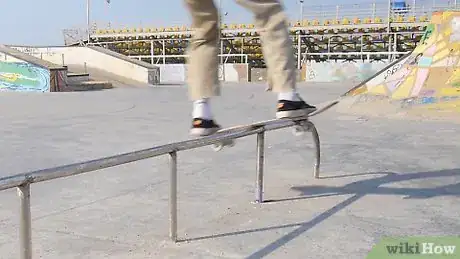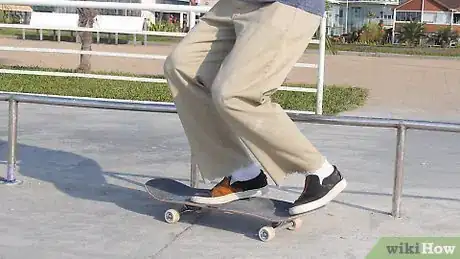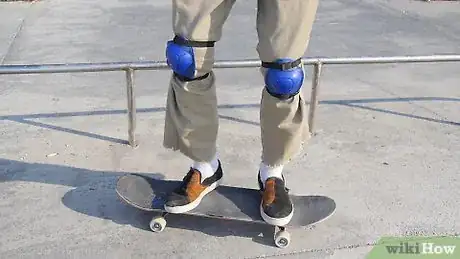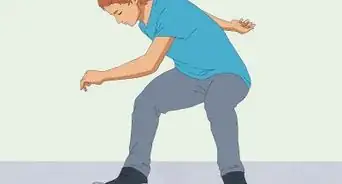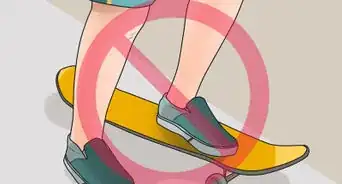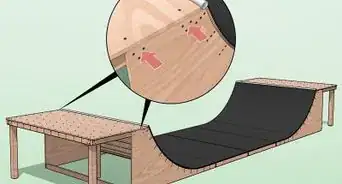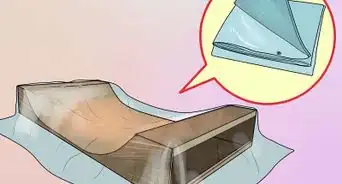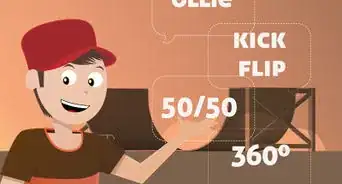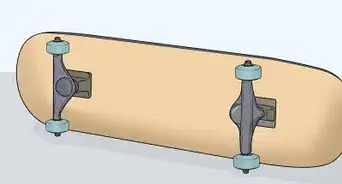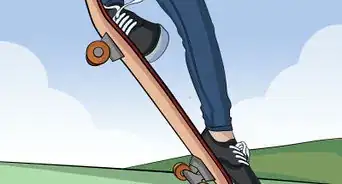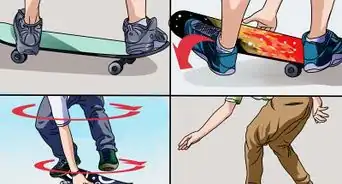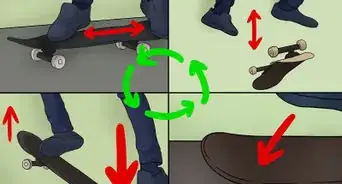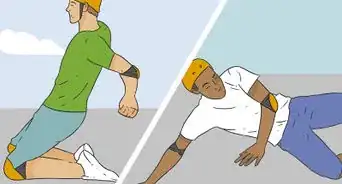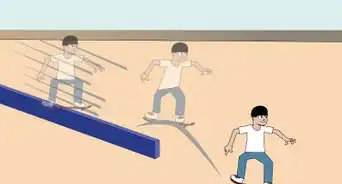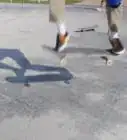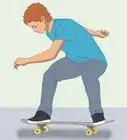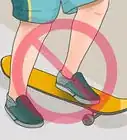This article was co-authored by wikiHow Staff. Our trained team of editors and researchers validate articles for accuracy and comprehensiveness. wikiHow's Content Management Team carefully monitors the work from our editorial staff to ensure that each article is backed by trusted research and meets our high quality standards.
There are 7 references cited in this article, which can be found at the bottom of the page.
The wikiHow Video Team also followed the article's instructions and verified that they work.
This article has been viewed 46,802 times.
Learn more...
A boardslide is a trick where you slide the middle of your skateboard across a rail or a ledge. This trick is similar to a grind, but you go much faster with a boardslide. Try this trick after you’ve mastered the ollie, as it makes it much easier to jump onto the ledge. With some practice and dedication, you can land this totally tubular trick.
Steps
Choosing the Ledge
-
1Start practicing on a parking block to get the hang of the trick. If you are a beginner skater, it is helpful to start on a concrete block found in parking lots. Find an empty public parking lot, and practice your boardslide here at first. Parking blocks are short, low rails that are easy to learn the basics with.[1]
- The parking blocks are smooth overall, which reduces your risk of injury.
- Using these help build your courage. You won’t be scared of falling and can focus on how to balance your body with the skateboard.
- Make sure you are not trespassing on private property! Look for any "Private property" signs or signs saying "No skateboarding" to ensure you are able to skate in your spot.
-
2Practice on a rail under 6 in (15 cm) after you nail the basics. After you are comfortable with the boardslide technique, you can try the move on just about any smooth straight surface low to the ground. Do this when you feel comfortable balancing the skateboard.[2]
- For example, move onto low railings or ledges in parks or parking lots.
- Always skate in places where it is legal and permitted.
Advertisement -
3Move onto more advanced rails when you can easily boardslide. When you feel like you can do a boardslide in your sleep, test your skills by sliding down staircase railings or high-up ledges. Do this when you feel like a pro!
- Don’t rush yourself. If you try a high ledge before you are ready, you can get seriously hurt.
- Consider purchasing your own rail so you can easily boardslide whenever you want.
Nailing the Trick
-
1Apply wax to the ledge so you can slide easier. Use specialty skateboard wax for best results. Rub a small amount over the entire surface of the ledge. Rub the block of wax directly onto the surface to cover the top, sides, and corners. If the board sticks to the surface, apply more wax as needed.[3]
- You can purchase wax at a skateboard shop or online.
- Without wax, it may be hard to slide across the surface.
- Do not apply wax to private property, or you may be charged with vandalism.
-
2Roll toward the ledge at a comfortable speed. For best results, position your skateboard at a 45-degree angle as you ride closer. The slight angle helps you easily get onto the ledge. Skate at a moderate speed that feels comfortable for you.[4]
- Avoid going too fast when you start. If you have too much speed, it may be hard to adjust your footing.
-
3Do an ollie to get onto the ledge. Performing the ollie trick helps you get onto the ledge. Put 1 foot (0.30 m) toward the tail of the skateboard, and place your other foot directly behind the front hardware. Bend your knees to crouch down, and jump upward with moderate force. The board should jump up with you. While you are in the air, move your board so it is over top of the ledge, and kick down on your back foot once you clear the ledge[5]
- Adjust your foot placement based on what is comfortable for you. It may feel better to move your front foot back a few inches.
- With the ollie, you can easily get onto the ledge. This trick also is a great way to practice balancing on your board.
-
4Position your board so the trucks are on either side of the ledge. As you ollie, put force onto the board after the wheels are clear of the ledge. Aim to land onto the board about 10–16 in (25–41 cm) from the end. When you land, position your back foot on the tail of the board and your front partly on the nose. Distribute your body weight evenly on both sides of the board to balance on the middle of the rail.[6]
- Your board should be centered on the ledge after you ollie.
-
5Slide across the ledge until you are close to the end. Let the board glide across your ledge. As you do this, bend your knees to adjust your weight, and lean back slightly to keep your balance. Get ready to get off the ledge when you are about 12–16 in (30–41 cm) from the end.[7]
- The motion of sliding may feel strange and foreign at first, but as you practice it will become more natural.
-
6Push the nose of your skateboard forward to dismount the rail. When you are about 12–16 in (30–41 cm) from the end of the rail, adjust your skateboard so it faces forward. To do this, swing your hips to face forward, and push down on the front of the board. Land with both feet on the board for a smooth finish.[8]
Preventing Injuries
-
1Bend your knees as you get onto and off of the rail. If you don’t bend your knees throughout the trick, you can get seriously injured. The amount you should bend your knees depends on the height on the ledge, but on average you want them bent close to a 45-degree angle.[9]
- Do this throughout the entirety of the trick.
-
2Wear a helmet at all times. When skateboarding, it is easy to fall and hurt your head. To prevent this, strap on a helmet that fits you correctly before you go skating. The helmet should feel snug on your head without much extra wiggle room.[10]
- Helmets prevent against concussions and head lesions, for example.
-
3Consider wearing elbow pads and knee pads as you learn the basics. While this is not required, elbow and knee pads are great tools to keep you safe. Do this if you are learning to skate and want to protect your arms and legs. Strap them onto your elbows and knees 1 at a time, and ensure they are tightly secured by the Velcro straps.
Warnings
- The more wax you use, the faster you will slide. Be ready to move quickly across the rail!⧼thumbs_response⧽
References
- ↑ https://youtu.be/_VgfjX-wZf4?t=1m15s
- ↑ http://www.skateboardhere.com/boardslide.html
- ↑ http://www.skateboardhere.com/boardslide.html
- ↑ https://youtu.be/zbiUQvk_4fU?t=2m49s
- ↑ https://youtu.be/zbiUQvk_4fU?t=1m28s
- ↑ https://youtu.be/zbiUQvk_4fU?t=3m1s
- ↑ https://youtu.be/zbiUQvk_4fU?t=3m18s
- ↑ https://youtu.be/zbiUQvk_4fU?t=4m2s
- ↑ http://www.skateboardhere.com/boardslide.html

